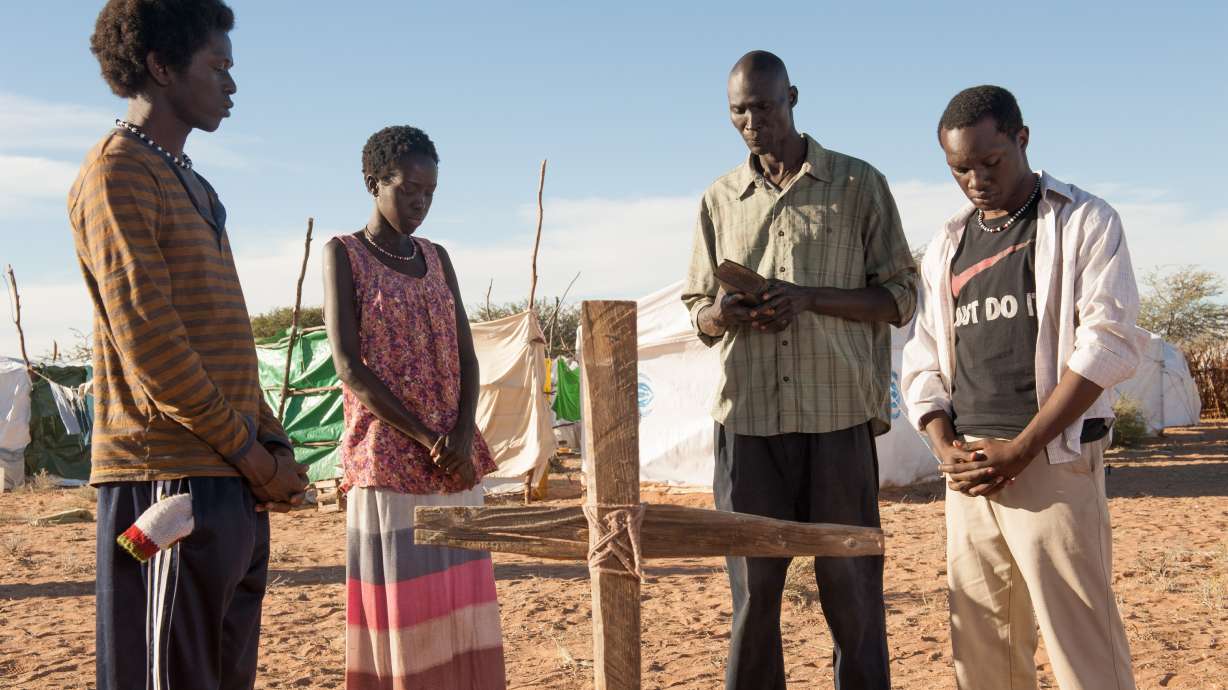Estimated read time: 3-4 minutes
This archived news story is available only for your personal, non-commercial use. Information in the story may be outdated or superseded by additional information. Reading or replaying the story in its archived form does not constitute a republication of the story.
The movie poster for "The Good Lie" features a smiling Reese Witherspoon, front and center. But, truth be told, neither Witherspoon nor her character is the film's star — not in the essential sense. The real stars are the Sudanese children at the bottom of the poster, their backs to us, trudging across an empty, sun-scorched expanse.
"The Good Lie" tells a fascinating story, that of the so-called "Lost Boys" (and girls) of Sudan, youngsters orphaned by the bitter war that engulfed their country beginning in 1983, forcing many to trek for hundreds and hundreds of miles — over several years in some cases — to safety. And, admirably, the filmmakers keep these youngsters — and the young adults they became — central in their storytelling. They may have a Hollywood star on their hands, but this isn't a Hollywood star vehicle.
It's probably safe to say that many Americans know little or nothing about the humanitarian effort, begun in 2000, to resettle thousands of young refugees from Sudan in U.S. cities. For that reason alone, this movie, directed by Philippe Falardeau, is worth seeing. Luckily, it's also a compelling film — occasionally a bit too earnest, perhaps, or overly broad in its humor, but often deeply moving.
The story is fictional, but based on extensive research by screenwriter Margaret Nagle, who interviewed hundreds of "Lost Boys." The film begins in a southern Sudan village, where two brothers, Theo and Mamere, and their sister, Abital, suddenly find themselves orphans when attackers come rampaging through, killing anyone in sight.
Since their father was the village chief, that title now falls to Theo, the elder brother. With a few other youngsters, they start a treacherous trek out of Sudan. They escape mass slaughter yet again by crossing a river, but lose Theo, who saves them by sacrificing his own safety. Eventually the small group winds up at the Kakuma refugee camp in Kenya.
Fast forward 13 years. Mamere, Abital and close friends Jeremiah and Paul have become a family unit. One day, their names appear on a list of refugees chosen for resettlement in America. Joyously, they board the plane.
Upon arrival in New York, the group is forcibly separated; boys to Kansas City, Abital to Boston. Despite that painful setback, the boys settle into new lives as best they can. Helping them is Carrie (Witherspoon), a tough-skinned type who works for an employment agency. They need jobs to stay in America and also to pay the government back for their plane tickets.
As the men adjust, there are a few too many culture-clash jokes: They aren't familiar with light switches, telephones, jello molds, the vast variety of types of Cheerios (that one's funny), ice rinks. But the cast is wonderful. The "Lost Boys" are played by actors of Sudanese descent, and they're terrific, especially Arnold Oceng as Mamere, who struggles to lead the group with dignity and determination, even as he chides himself for surviving when Theo did not.
It's fascinating to read the biographies of this well-chosen cast. Oceng fled the war zone at 2 years old. Actor-rapper Emmanuel Jal, who plays his talented but troubled friend Paul, was a child soldier during the war, and like many war orphans, doesn't know when he was born. Ger Duany, who plays religious-minded Jeremiah, was also a child soldier, and gained refugee status in the United States at age 16. The lovely Kouth Wiel, who plays Abital, was born in a refugee camp.
And about that title: "The Good Lie" is a reference to the lies Huck tells in "The Adventures of Huckleberry Finn" — lies that are "good" because they protect another person. It's also a reference to this movie's hugely moving ending. We won't give it away. But bring the Kleenex.
"The Good Lie," a Warner Bros. release, is rated PG-13 by the Motion Picture Association of America for "thematic elements, some violence, brief strong language and drug use." Running time: 110 minutes. Three stars out of four.
_
MPAA definition of PG-13: Parents strongly cautioned. Some material may be inappropriate for children under 13.
Copyright © The Associated Press. All rights reserved. This material may not be published, broadcast, rewritten or redistributed.








